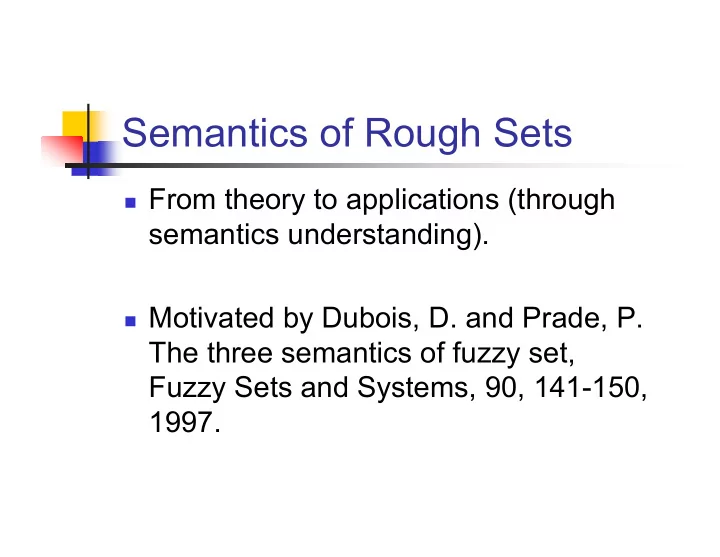

Semantics of Rough Sets From theory to applications (through semantics understanding). Motivated by Dubois, D. and Prade, P. The three semantics of fuzzy set, Fuzzy Sets and Systems, 90, 141-150, 1997.
Rough sets and concepts Rough sets for modeling concepts, or more precisely the extensions of concepts.
Concepts A concept, in the classical view, is defined by a pair of intension and extension. The extension: instances to which the concept applies. The intension: a set of singly necessary and jointly sufficient conditions that describe the instances of the concept.
Concepts: idealization Concepts are assumed to have well- defined boundaries and their extensions can be precisely defined by sets of objects.
Concepts: reality Concepts in many practical situations cannot be precisely defined and their extensions may not be given exactly by sets of objects.
Concepts: generalization Concepts with grey/gradual boundaries. Partially known concepts. Undefinable concepts. Approximate concepts. … … … … * Last three situations were discussed by Marek, V.W. and Truszczynski, M. Contributions to the theory of rough sets, Fundamenta Informaticae, 39(4) , 389 - 409, 1999.
Concepts with grey/gradual boundaries There is not a well-defined boundary that differentiates the instances from the non- instances of the concept. For some objects, the concept only applies partially instead of fully. Fuzzy sets . * Zadeh, L.A. Fuzzy sets, Information and Control, 8, 338–353, 1965. * Dubois, D. and Prade, P. Fuzzy rough sets and rough fuzzy sets, International Journal of General Systems, 17, 191-209.
Partially known concepts An object may actually be either an instance or not an instance of a concept. Due to a lack of information and knowledge, one can only express the state of instance and non-instance for some objects, instead of all objects.
Partially known concepts One has a partially known concept defined by a lower bound and upper bound of its extension. Interval sets Y.Y. Yao, Interval-set algebra for qualitative knowledge representation, Proceedings of the Fifth International Conference on Computing and Information, 370-374, 1993.
Undefinable concepts In general, the intension of a concept may be defined by using a logical language, such as the decision logic language in rough set theory and knowledge representation languages of description logic.
Undefinable concepts It may happen that some objects cannot be differentiated due to the use of a fixed and limited set of attributes for their description. The language may not be able to define certain sets of objects that are the extensions of some concepts. That is, we have some undefinable concepts with respect to a particular language..
Undefinable concepts We have to approximate undefinable concepts by definable concepts. Rough sets . Pawlak, Z. Rough sets, International Journal of Computer and Information Sciences, 11, 341-356, 1982.
Approximate concepts One knows the exact extension of a concept and the language can precisely define the concept. The description may be too complex to be of any practical value; it may be difficult to understand and manipulate.
Approximate concepts This may require us to approximate the concept by some concepts with simple descriptions. Rough sets . * Marek, V.W. and Truszczynski, M. Contributions to the theory of rough sets, Fundamenta Informaticae, 39(4) , 389 - 409, 1999.
Thank You! http://www.cs.uregina.ca/~yyao/rough_set.html
Recommend
More recommend